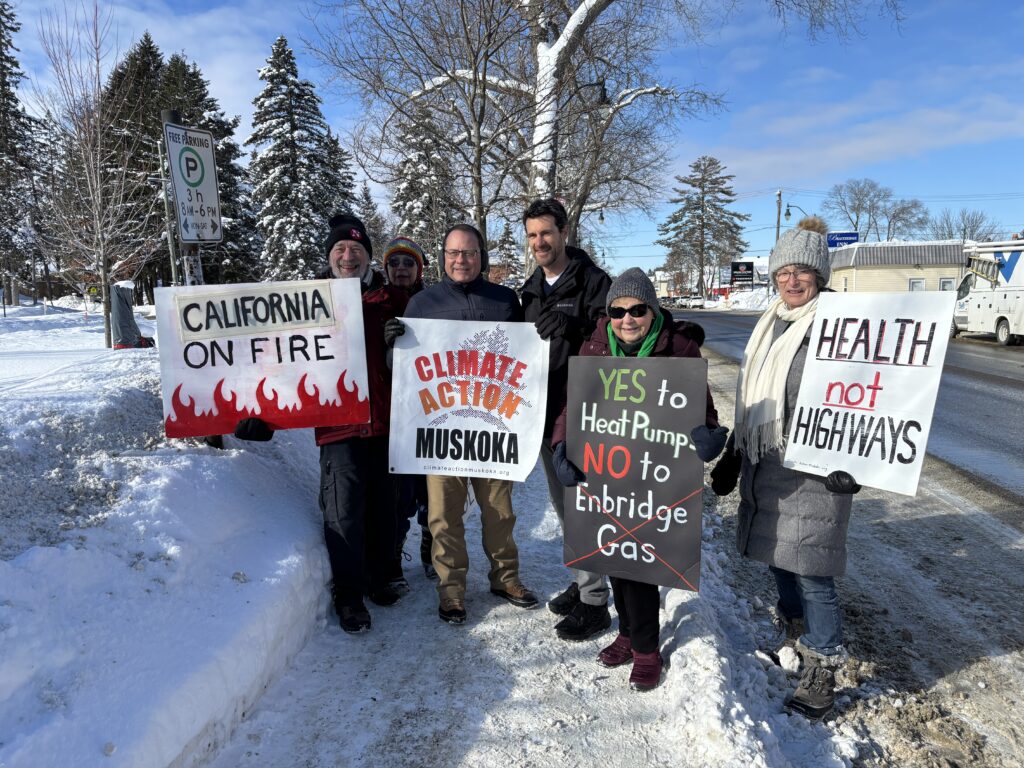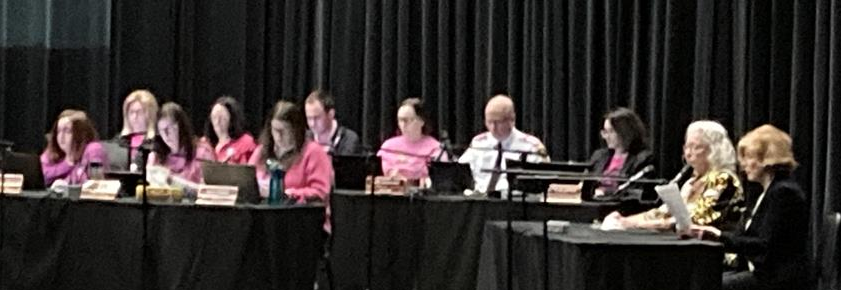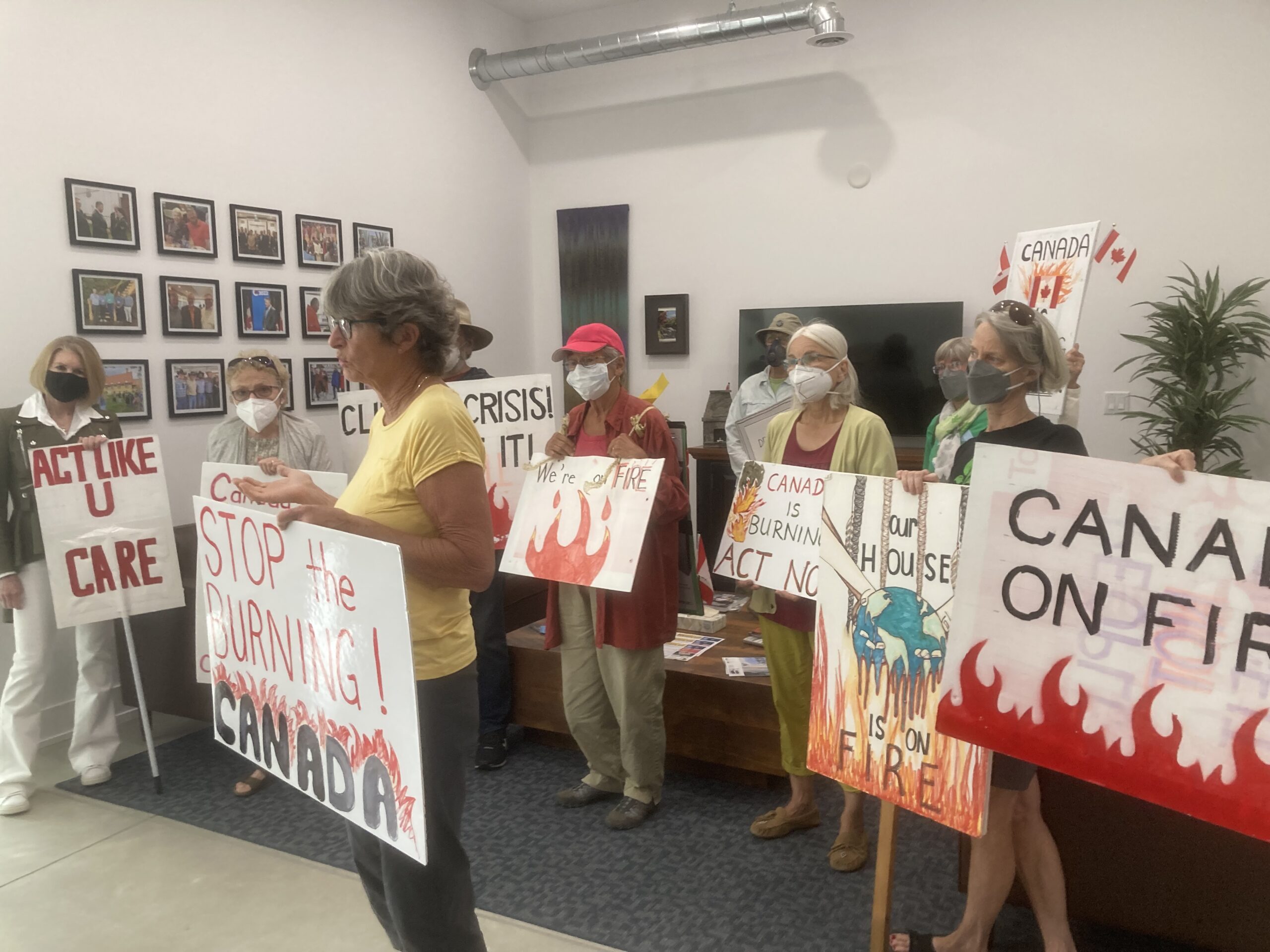Ever wanted to know what is actually said in meetings with politicians? Here are the notes from the meeting between Ontario Minister for Natural Resources and Forestry and Parry Sound-Muskoka MPP Graydon Smith and representatives from several climate action groups, at Minister Smith’s Bracebridge office, Jan. 19, 2023.
Attendees
- Graydon Smith, Ontario Minister of Natural Resources and Forestry and MPP for Parry Sound-Muskoka
- Landon French, assistant to Graydon Smith
- Linda Mathers, Climate Action Muskoka
- Sue McKenzie, Climate Action Muskoka
- Kevin Logie, Climate Action Parry Sound
- Stephen Todoroff, Almaguin Climate Action
Introduction — Linda Mathers
Minister Smith, we are not here as protesters. We are here as your non-partisan, deeply concerned constituents. We represent wide and deep opposition to this legislation. We request that you hear us out on these concerns and solutions we bring to you. We ask you to take them to your caucus, your cabinet and Premier Ford and bring back a response at a follow up meeting which we would ask to schedule at the end of today’s meeting.
In our riding, while we speak directly for our climate organizations, our points of opposition are on the same page as countless other organizations as well as everyday citizens in our communities. In Parry Sound Muskoka, opposition is coming from housing and poverty advocates, municipal leaders, spiritual and community organizations, business leaders, environmental organizations, health care groups and the broad base of scientists in organizations such as the MWC, Friends of Muskoka Watershed, Muskoka Conservancy, Georgian Bay Biosphere to mention only a few. We also speak for so many folks in our riding who think their voice doesn’t matter. They will go unheard.
We, all of the above, are very worried.
We represent not only this broad cross-section of opposition within your constituency but we are also part of a large global voice. The impacts of climate change are in the news multiple times every single day. People now recognize that rapid, transformative decarbonization around the world is absolutely essential to keep the planet habitable for humans. It is coming.
While municipalities, cities and states around the world are embracing this rapid transformation, in Ontario, Bill 23 is widely and deeply opposed as a failure to urgently address both our real need for affordable housing and our need for real climate solutions. That’s why we are here.
In a limited time frame we can only bring forward a few of our shared concerns. We will each take five minutes to share points of concern, then we are open to discussion on these matters. Our hope is to come to common ground, some proposed solutions and a path forward to withdraw parts and re-write other parts in this Bill.
Sue McKenzie Presentation Notes
Yesterday, I asked my children if they had any message they would like me to deliver from their generation to the Minister of Natural Resources and Forestry. This was their response: “The future is here. It’s time to change the way we look at everything.”
The same day the Secretary General of the UN spoke to the World Economic Forum: “And we are looking into the eye of a Category 5 hurricane. Greenhouse gas emissions are at record levels and growing.”
So, it is from this space of urgency that I am here today to ask why Ontario is bringing in policies which will ensure those emissions will rise even further?
I will speak to how Bill 23 impacts Muskoka and the unanimous commitment of its municipal leaders to reduce GHGs 50% by 2030 reaching zero by 2050. Minister, you were on two of the councils which put those goals in place. There is climate work to be done by both your generation and mine.
The New Leaf Community Working Group has just completed a year-long Climate Vulnerability and Risk Assessment and developed a Climate Adaptation Plan. The Climate Mitigation plan will be developed this year.
The Federation for Canadian Municipalities says:
- Municipalities influence more than half of Canada’s emissions.
- They go on to say: Municipal power to act on climate is vital to meeting our promised targets, through deep energy retrofits of public buildings, active transportation infrastructure, zero-emission vehicles and public charging stations, building codes that drive down emissions, densification, natural climate solutions and, most importantly, reduced reliance on natural gas for heating.
The loss of municipal power and governance through policy changes in Bill 23 severely restricts Muskoka’s ability to quickly implement our Climate Adaptation and Mitigation Plans.
Site plan controls provide the best vehicle for achieving decarbonization of the building sector and the transport sector. They have been a significant municipal planning tool in designing our local communities and protecting our lakes from over-development.
Leading Toronto architects and planners state: “… design (through site control) is directly related … to climate change mitigation …and in delivering safe, healthy, affordable, socially and environmentally sustainable communities to the people of Ontario.” https://www.kpmb.com/news/response-to-ontarios-proposed-bill-23/
Your government says we must expand urban boundaries and build sprawling subdivisons which build in car dependency and rising GHG emissions for decades to come to provide enough housing.
However, land is not the issue in addressing the housing crisis, according to your own government’s task force. The Association of Municipalities of Ontario says over 285,000 approved housing units exist RIGHT NOW across 19 large municipalities.
Land is not the issue in Muskoka either. Currently, there are 5,843 draft subdivision lot approvals which can move forward. Only 419 of those lie outside urban boundaries.
Developers ask for extensions to these approvals over and over. Your government could require these be built in a timely fashion using low carbon materials and non-fossil fuel heating, quickly increasing a much-needed supply of housing in the District while reducing GHG emissions from the housing sector.
Research shows that municipal costs to service sprawl (more hydro, water, sewer, paving, public services, schools) are super high. As well, sprawl destroys important carbon-sequestering wetlands, farmlands and forests. It is incumbent upon us to densify already-serviced areas.
The changes to development fees, community benefit charges, permit approvals and the requirement to spend 60% of reserve funds annually can only result in increased municipal taxes and the inability to pay for and to save for big infrastructure projects and new climate infrastructure. These increases are already appearing for 2023 budgets as municipalities begin to grapple with the “unintended consequences” of Bill 23. Can we also find some common ground amidst those “unintended consequences”?
And finally, I must address the elephant in the room. Your government is expanding fossil gas plants and infrastructure across the province – even right here in Muskoka and Almaguin – despite the call from 34 Ontario municipalities, including Bracebridge, for a Gas-Fired Power Phase Out.
Gas is not low carbon. It is a fossil fuel which releases methane all along the supply chain. To promote expansion of fossil infrastructure in the face of a climate emergency is appalling! We have modern heat pump technology which is clean, available and can provide numerous Muskoka jobs as we address our housing crisis.
In a business context, in Ontario our 92% emission-free grid provides an extremely appealing opportunity to companies looking for places to locate which allow them to decarbonize their operations. That appeal will disappear with a grid which is becoming dirtier through provincial policy.
If there is one message from your constituents that I want you to take back to the Premier and Caucus, it is this: Addressing both the climate crisis and the housing crisis MUST go hand-in-hand. The solutions to decarbonization of the economy are also the solutions to the housing crisis; they are fiscally responsible; they represent a HUGE economic opportunity for Muskoka and Ontario into the future.
Minister, you have been given a huge personal opportunity to influence the future in your role as Minister. It is not too late to change direction, to leave the subdivisions and highways of the 60’s behind, to live within our existing urban and planetary boundaries, and to decarbonize the Ontario economy asap.
Kevin Logie Presentation Notes
Representing more than 30 climate Action folks in Parry Sound.
Climate Action Parry Sound started in 2018, was derived from Fridays for Future of Greta Thunberg – Frank Thompson, Merry Brydges, Ken and Judy Christenson. Climate strikes every Friday in front of Norm Miller’s office, then downtown – various actions on designated days (coming up Climate Strike 03/03/23). We are seeking the greater good and well-being for all in Ontario.
Opposition to Bill 23 in widespread among those I spoke with in Parry Sound: The need to preserve and protect local farmland, the sense that once it is paved over, we cannot get it back. Growing frustration around lack of provincial government leadership regarding the crisis issue of climate change. Examples; fighting the carbon tax, removal of home energy retrofit subsidies, withdrawal of support for solar and wind power development, removal of EV subsidies. Ontario is being left behind in greening economies.
Lasting legacy
- Many excellent submissions made around Bill 23, i.e. Georgian Bay Biosphere, housing groups, AMO which you previously chaired.
- I don’t claim to be an expert, but I do know the importance of asking the legacy questions. As our Indigenous brothers and sisters would ask, what are the implications of this for the next seven generations?
- Legacy of the Greenbelt. Some of your own Conservative Party predecessors were a part of its establishment.
Climate Crisis – the need to go in a different direction, learning from mistakes of the past and urban sprawl and development. Climate emergency – mitigation versus wrong direction – more of the same only adds to the climate change problem rather than working to solve it.
We need to restructure our society. We need to move to localized economic structure: where people live and work where they reside – local food movement – and fledgling efforts here in Parry Sound Muskoka – reliance on Greenbelt for local foods – serious issues of food security faced by many – growing costs environmentally of transport of food – 880,000 jobs in food sector – cannot afford to diminish these further.
Food Security – locally and provincially – Farmland – learning through COVID of the dangers of becoming too reliant on the global supply system.
Precarious Housing – Affordable Housing – food security -and large portion of limited income on shelter leaving very little for food and the basics of life.
Cannot understand expenditure of considerable political capital in rezoning part of the Greenbelt. High fiscal cost of developing infrastructure in Greenbelt for housing – not fiscally responsible.
The Ontario Housing Task Force found the housing crisis not because of lack of land. Many approvals already here in Parry Sound Muskoka. It is more a problem of labour and getting skilled workers to build the homes.
Challenge of development – sole reliance on private sector – money will go to place of most lucrative return. We see that in how trades people quite naturally will gravitate to high income property development because that is where the money is. (i.e. waterfront condo developments in Parry Sound). How will this bill mitigate this effect and encourage the building of much needed affordable housing?
Local autonomy especially regarding net zero aspirations – heat sources of new homes and moving from our fossil fuel addiction – need to encourage reduction of emissions – how does the bill do this?
Shell game of claiming Greenbelt development lands replaced by adding other lands to it.
Appreciate moves in the bill to allow more high-density housing such as triplexes. We need to go further in this regard; i.e. four storey walk-ups. One thing I have come to appreciate about Parry Sound is the variety of options (many homes with apartment options, live across the road from the Hub – even though they are clearly not enough to meet demand).
Questions – What do you see as the biggest climate issue the Bill will impact?
How will the bill seek to address solutions to the climate emergency instead of adding to the problem?
Linda Mathers Presentation Notes
I will frame my comments around the “Big Picture.” With the passage of Bill 23 and the changes in regulations across a number of ministries, we are failing to PROTECT that which PROTECTS us. Wetlands, shorelines, forested areas and agricultural lands, the very things that ensure clean water, clean air and a source of food are impacted. I will speak to the re-evaluation of wetlands and the dismissal of shoreline protections and how that compromises our climate resiliency and ability to address our commitments to emissions’ reductions.
The implications of this legislation are of particular concern to us in Muskoka where our environment and our economy are deeply connected. We live in a part of the province that is mostly lakes, water, trees and rock. As Minister of Natural Resources and Forestry, this is your opportunity to protect these essential natural spaces and places for your children and their children.
I wish to zero in on how this bill undermines both provincial and municipal decision-making by changing the rules to enact policies around land use, and watershed-wide planning that will ensure we protect those assets that protect us especially in a climate in crisis.
I too hope we will find some common ground in the unintended consequences of Bill 23 to Parry Sound and Muskoka. We must look for the opportunity to protect those systems in our natural world that protect us. We must do everything we can to keep our planet habitable. The consequences of our failure to do so are overwhelmingly negative.
With the More Homes Built Faster Act we are failing to PROTECT that which PROTECTS us.
Instead of building resilience and mitigating climate change we are placing Ontario at greater risk.
Changes to the Ontario Wetlands Evaluation System (OWES) under Bill 23 all but eradicate the protection of wetlands and changes to Site Plan Approvals under Bill 23 will remove our ability to protect shorelines, essential for climate mitigation.
1. HOW wetlands, forest ecosystems, natural infrastructure in general, PROTECT US and therefore why it is critical to PROTECT these systems. We are a region of lakes and forests. Hugely important natural infrastructure here and for the whole province.
Critical natural infrastructure that wetlands in particular provide:
- carbon sinks that hold the carbon we so need to keep carbon out of the atmosphere; nature’s intricate carbon capture system. Bull-dozing them will release significant GHG’s especially methane and act as a carbon bomb
- flood mitigation giving record amounts of rainfall a place to be absorbed and released slowly,
- drinking/groundwater protection filtering, cleansing including debris and run off from spills, construction sites,
- critical species habitat and the essential need to protect biodiversity (Outcome of recent COP 30% by 2030 for planetary survival) (Use personal classroom examples of interdependence of species, habitat protection and the web of life he learned as a student growing up in Muskoka Reference George Anderson and Yearley)
Consequences of these changes to OWES that will re-evaluate wetlands individually rather than as complexes, especially in Muskoka where many wetlands are small but a critical part of larger systems. They will now fail to meet the new criteria and fall off the radar as important to protect. We must not let this happen. The science is clear:
- Essential to evaluate them as complexes.
- Collectively they have important ecological functions critical to the Muskoka and Parry Sound landscapes.
- They work together and cannot be dismissed as inconsequential to protect
- Wetlands in the watersheds around our hundreds of lakes filter nutrients that if released would contribute to increasing algal blooms (share personal example from Brandy Lake)
Vulnerability of wetlands to climate change (some specific examples here) and therefore increasing need to protect
- Wetlands are vital because of the way water circulates through them.
- With changes to this hydrological cycle that we are seeing with climate change (longer and heavier rainfall events and longer dry periods), wetlands will have more stresses and be more vulnerable than ever, including at increasing risk of drying up.
- Now is the worst time to reduce protections.
2. HOW shorelines protect us in Muskoka and around the province. Consequences of removing shoreline approvals. We have hundreds and hundreds of lakes. Vast freshwater resource.
- Role of naturalized shoreline protections to mitigate climate events, protect water quality, reduce algal blooms, and maintain the integrity of deeply connected ecosystems.
- Local planning is being undercut when we need more—not less—oversight. Already challenged by loopholes the developers find (Sugarloaf Island, Brandy Lake shoreline bulldozed as personal example), irresponsible over-development already consequential here. Forests around our towns are being bull-dozed for housing out of reach of most Muskoka residents
- Failure to have stringent site plan approvals and shoreline protections will ecologically sever lakeshores from terrestrial habitats inland or between waterbodies. Destroying natural ecosystem connections means we are destroying our own habitat for now and the future generations.
- Climate heating is increasing algal blooms. For example, green paint sludge already increasing on lakes across our riding.
3. We must PROTECT that which PROTECTS us. We cannot reconstruct natural environments. Once gone they are gone. Argument of replacing lands taken from Greenbelt is a smoke screen not a reality.
- Offsetting wetland creation – easy to say but very difficult to accomplish.
- Impossible to do for fens and bogs and numerous other wetland types very prevalent across Muskoka and Parry Sound. These will go unprotected in spite of being essential infrastructure, critical to protect with rapidly changing climate.
- Very difficult to mimic a wetland’s water budget when designing an offset in some other piece of a site (nature didn’t provide the surface-groundwater functions in the offset site for a reason).
Bill 23 takes us on an irreconcilable pathway to increasing emissions and fails to address climate heating mitigation through natural infrastructure. Bill 23 means you will fail to protect that which protects us.
Stephen Todoroff Presentation Notes
My name is Stephen Todoroff and I have two questions for you.
First, as Chair of the Housing Committee for Almaguin Highlands Community Living I am pleased that your government recognizes the dire need for affordable housing. However, I want to make it clear that your definition of affordable, i.e. 80% of market value, is still excessive for the clients we serve. I will give you an example which is all too typical.
A client receives $1200/month on ODSP. They pay $695/month to rent a small 1 bedroom apartment. They pay 58% of their income on rent. CMHC recommends a 30% threshold. If your 80% standard is applied it could reduce their rent to $556 but that is still 46% of their income. Again well in excess of the CMHC’s recommended amount.
1) My first question is, can amendments be made to bill 23 to specifically address the concern that my clients face in being forced to pay well in excess of 30% of their income on housing.
2) Secondly, as a member of Almaguin Climate Action, I am concered with the degradation of our enivironment and more specifically how and why the Greenbelt is being opened up for development.
I will read to you from your government’s Ontario Housing Affordability Task Force’s report dated Feb. 8, 2022:
- A shortage of land isn’t the cause of the problem,
- Too much land inside cities is tied up by outdated rules,
- Underdeveloped land inside and outside existing municipal boundaries must be part of the solution, particularly in Northern and rural areas, and perhaps most importantly:
- Greenbelts and other enivronmentally sensitive areas must be protected, including farmland needed to provide food and food security.
My question then is, why ignore your own task force, which included your former leader Tim Hudak, and open the Greenbelt for development when it is not necessary to do so?
Written Notes Provided to Graydon Smith
Thursday, January 19, 2023 10-11 am at the Bracebridge Constituency Office
Presented to MPP Graydon Smith, Minister of Natural Resources and Forestry at the meeting between he and the Parry Sound Muskoka riding climate groups: Climate Action Muskoka (CAM), Almaguin Climate Action (ACA) and Climate Action Parry Sound (CAPS).
Follow-up questions for which we respectfully request answers. Please share with the Premier and the Caucus.
- What do you see as the biggest climate issue the Bill will impact? How will the bill seek to address solutions to the climate emergency instead of adding to the problem?
- Will you withdraw the changes to the Ontario Wetlands Evaluation System (OWES) in order to protect these critical ecosystem infrastructures acting as carbon sequestering sinks, providing clean water and offering protections from flooding and drought?
- Will your government revise Bill 23 to reinstate site plan approvals for builds in all areas of the province?
- We request that you and your government apply the following suggestions which address the climate imperative and also provide solutions to the housing crisis in Ontario when implementing your housing agenda.
Your government could:
- Build hundreds of thousands of modest, affordable homes for everyday working families that were limited to 900 – 1200 square feet with 2-3 bedrooms and one or 1 1/2 bathrooms
- Build these homes into existing neighbourhoods with existing infrastructure: public transit, schools, water, sewers, community centres, village squares and 15-minute, walkable services and active transportation networks
- Use mixed housing models of rentals, multiplexes, low-rise small apartment and shared seniors housing built into existing neighbourhoods
- Require all housing be heated and cooled with non-fossil fuel air- or ground-source heat pumps
- Require legitimate and tested green building standards for materials for construction of homes and insure carbon zero buildings within the decade, an achievable standard around the world.
- Create EV infrastructure and electrify local municipal services, including transportation, building heating and cooling
- Require local smart green grids transitioning every community to renewable sources of energy
- Set boundaries around urban areas, including town and village centres in Muskoka, Parry Sound, and Almaguin to prevent the clearcutting of forested areas that clean our air, protect the farmlands that feed us and wetlands that provide flood protection and essential biodiversity.
- Mandate building “in” instead of “out”
- Require that existing draft subdivision approvals be built in a timely fashion using low carbon materials and non-fossil fuel heating, quickly increasing a much-needed supply of housing in the District while reducing GHG emissions from the housing sector.
- Cancel current and future rural subdivision (sprawl) approvals (approximately 400 in Muskoka now) which create sprawl – already an alarming feature of new development in Parry Sound Muskoka
Sue McKenzie, CAM, Linda Mathers, CAM, Kevin Logie, CAPS, Stephen Todoroff, ACA






